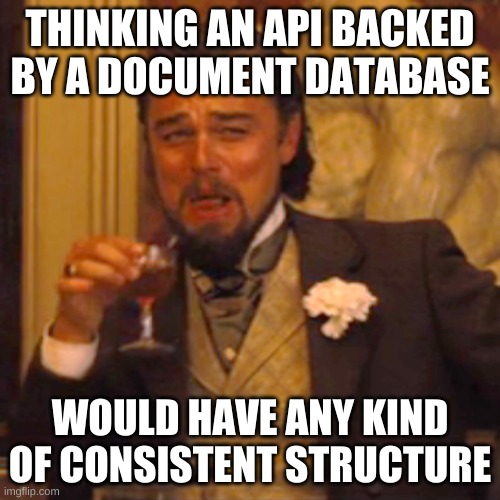Reflections On Using Haskell For My Startup
Almost exactly one year ago I quit my job to create a Haskell startup as a solo developer. I had about 20 ideas, but eventually settled on the idea of dependency project health tracking with Deadpendency.
This post describes the experience and evaluates Haskell and its ecosystem.
Disclaimer: This blog post contains a bunch of memes. They are trying to be humorous, not accurate or fair 😉.
Why Haskell?
Since about 2016 I have had a strong obsession love of Haskell. Prior to learning Haskell, I was an experienced OO style developer but I didn’t really know how to keep improving my raw programming ability. Haskell introduced me to the world of functional programming (FP) which has an almost infinite depth of concepts to learn, which do actually help improve code quality and application architecture.

Haskell is challenging to learn, but extremely fun to write. For my own learning and pleasure, if my startup succeeds, I want to be doing Haskell.
Additionally, I think Haskell is the best general purpose programming language (that you can use in production). In particular, Haskell excels at writing ‘boring’ business applications which is typically what I work on. ‘Why Haskell For Production’ goes into more detail on the benefits Haskell offers.

The Setup Phase
Probably the most challenging part was building out a skeleton architecture to hang my business logic on. I decided to go with, even within Haskell, fairly advanced libraries of servant and fused-effects.
I spent a fair amount of time banging my head against a wall trying to get these libraries to work nicely together. This was primarily from a lack of Haskell ability on my part. I had prepared as best I could, but Haskell is deep and I needed to learn more to work day to day with it. I was lucky enough to eventually find an example that marries these two libraries together, which was a life saver. I’m sure I would have gotten there eventually, but I was in a bit over my head at that point.

Haskell is awesome, but like most languages there is cruft and legacy to be avoided. Haskell has a standard library known as base which unfortunately has a fair amount of unsafe or unperformant functions included. As such I went with an alternative standard library relude that builds on and improves base. On top of this, there are many core libraries that are not part of the standard library I wanted to use and have nice patterns around.
Additionally, I was deploying to google cloud and so needed to figure out good patterns for that integration from Haskell.
This setup effort was quite challenging. I spent most of it squinting at compiler errors. Yet it only took about 2 weeks to have a good foundation of code to start building my business logic upon.
Building it Out
This is when it started to get really fun. I had my core patterns set out and I could focus on building a pipeline. The day in day out of writing out my logic as small pure functions that I composed together was very nice.
Haskell has such impressive auto-magic code generation techniques that you spend much more time focused on the interesting logic of your application rather than boilerplate.
data HappinessLevel =
Miserable
| Sad
| Average
| Happy
| HaskellDeveloper
deriving (Show, Eq, Ord, Bounded, Enum, ToJSON, FromJSON) -- magic code generation
-- ok not really magic, think 'convention over configuration'
-- where you can have generated sane defaults, or customise if you like
And personally I think Haskell is quite beautiful to read and write. #notbiased
Parsing Libraries
A lot of the logic of Deadpendency is parsing. Either parsing dependency files or parsing various API responses. Haskell has many excellent parsing libraries, most notably aeson for JSON.
Why is this nice in Haskell? The ‘monad’ abstraction is excellent for dealing with code with a lot of failure conditions (ie. parsing) and avoids ‘pyramid of doom’ type code. Haskell worked out really well in this key area.

Testing
Another strong positive for writing Deadpendency was testing. Haskell has a lesser-known style of testing libraries that do ‘property based testing’ (PBT).
PBT allows you to write value generators for your data types, which you use to generate 100s or 1000s of test cases. Then, you run these generated values against some function and check that certain properties hold.
For example, part of the Deadpendency logic is generating an HTML report at the end. I had some toHtml :: Report -> HTML function that I wanted to test. So I wrote a fromHtml :: HTML -> Report function where it goes the other way (ok writing that was pretty painful). Then my PBT test will generate 100s of Report values and check that report == fromHtml (toHtml report) (this is known as ‘roundtrip testing’). With this single test I was able to find many edge case bugs with my HTML report generation logic.

PBT exists in some other languages, but it originated (I believe?) in Haskell so the libraries are excellent.
Not Actively Maintained Libraries
A big challenge of working with Haskell was the lack of well-maintained libraries. Ironically, of the 75 (!) packages I depend upon 19 are flagged by Deadpendency as unhealthy (deprecated or inactive). This means I often don’t have the luxury of asking library maintainers to fix bugs. Even if I PR a fix, sometimes that PR will be ignored for months.
This I think is the reality of using a niche language like Haskell. To be clear, I do not think library developers owe me anything, but it is nonetheless a downside when compared to more popular languages.

Thankfully Haskell build tools have good support for loading a package from git. This means you can PR some bug fix or feature and immediately use your fork to work around the problem.
Compile Times.. Were Fine
I thought I’d call this out as it is a common complaint I see around Haskell. I followed some good advice which kept compilation fast (aside from one interesting edge case I resolved).
- Number of modules (Haskell source files) - 509
- Number of lines of Haskell - 20090
- Number of dependencies - 75
- Dell 9570 XPS Laptop - (Hex core - 8th-gen Intel Core i7-8750H CPU), 32GB memory
So what are the numbers?
Compile dependencies from scratch
Time: 17m44s
This is compiling all application dependencies, which needs to be done before you can compile your application code. Rebuilding all from scratch rarely happens as both my dev machines and CI will cache and only rebuild what has changed.
You do sometimes update a very core package which triggers a lot of dependent packages to recompile which can take a while. Although, I usually do dependency updates at the start of the day while I’m sipping my coffee, so usually don’t notice.
Compile app (including tests) in development
Time: 1m1s
Likewise, due to caching a full recompilation rarely happens. As such, most code edits do not trigger many modules to be recompiled and it is fast.
Additionally, Haskell has nice ‘continuous compilation’ tools that fire on save. Usually by the time I actually look at my terminal compilation is already done.
Compile app for deployment
with full optimisations (-02).
Time: 2m53s
This typically runs in CI. It runs in parallel with a host of other checks such as running my tests, which also take a few minutes. Due to this, the time doesn’t really impact the build + deploy time too much.

Refactoring Pain
Deadpendency is relatively simple in what it does, but there is a lot of hidden complexity to the problem. Which is to say, it is like 99% of applications 😉. When developing it I was constantly realising I had modelled things a bit too simplistically and would need to refactor.
Haskell is very safe to refactor thanks to the type safety the compiler brings, which is probably the most important thing. However, Haskell does not have great tools to help with refactoring, at least in terms of the restructuring changes I kept making. The existing tools seem more geared towards complex rewriting of common code, not restructuring modules or renaming identifiers.
As such I did it all manually with text search replace, or just change something and fix all the new compiler errors. This was a bit of a grind and it caused me to delay needed refactoring sometimes.
It’s a pity Haskell doesn’t have the refactoring tools to help in this situation. The dream would be these tools integrated into an IDE.

(Stolen from reddit)
Having said that, it should be noted that Haskell does have an excellent IDE now in the form of Haskell Language Server (HLS). The momentum around the project is insane and I applaud the developers. One fixed pain point from HLS is it does auto imports now, which used to greatly contribute to the friction of working with Haskell. I’m sure Haskell will get there eventually.
Waiting for New GHC Versions to be Usable
This is mostly me complaining for the sake of it, but as someone pretty obsessed with both new shiny versions of things and Haskell, waiting for new GHC (GHC is the Haskell compiler) versions to be usable has been painful. There is a long tail of libraries and platforms that need to be updated before I can use a new GHC version. Sometimes these updates can drag a lot.
For example GHC 9 was just released, but I still haven’t been able to upgrade to GHC 8.10 yet which was first released in March 2020.

Launching
So after about 8 months of work I was ready to start getting users. I slowly soft launched, promoting it in a few small channels. How did my Haskell fair in prod?
Very Few Logic Bugs
My core Haskell had very few logic bugs. This is because Haskell is very safe by default and I had opted into strict types that help catch edge cases.
For example, I was using a lot of NonEmpty lists which the compiler will guarantee is not empty. To use them you must specify how to handle the empty case. ie. what do I do if Deadpendency can’t find any dependencies to check?
And of course, I had many tests as the compiler cannot find all the bugs.. yet..

Too Strict Parsing
A big pain point was the package registry APIs had a lot of inconsistency on how they are structured (especially NPM). For example, for an NPM package you can get the latest version by getting dist-tags -> latest. What about a package that has no release? Well you get dist-tags: {}, except that it turns out that some packages don’t even have the dist-tags key at all.
I quickly realised I would need to gracefully handle parse failures like these as there was so much variance in structure.
This issue sounds like a classic argument against static typing, but dynamic type systems are not inherently better at dealing with unexpected data. Dynamically typed languages may more gracefully ignore, or delay the failure, but I prefer the Haskell philosophy of immediately failing when data is an unexpected shape.

Memory issues
The other big pain point was memory usage. I was using Google Cloud Run which is sort of like AWS Lambda where you can specify how much memory you need. To keep things cheap and to better understand the memory needs of my app, I went with the minimum of 256MB. This amount seemed fine until I went to prod and Deadpendency was trying to check a wider variety of packages.
The core issue was.. NPM again had some rare packages that have huge JSON payloads, the worst case being 84MB uncompressed. It turns out that aeson will convert all the JSON into an AST first, before it then attempts to parse it to your type. This is fine when the JSON is small, or you are loading most of the contents of the JSON. In my case the AST (or the parsing?) apparently took about 20x the amount of memory of the raw JSON, when I only needed a tiny amount of the data.
Eventually I realised I should use a library designed to parse in constant memory and all was well. I can parse the 84MB file and only see 84MB used. I could take this even further and stream the response, but for now it is working fine as is.

Any Memory Issues Due to Laziness?
As a lazy language, Haskell is known to have memory issues due to unevaluated expressions accumulating in unexpected ways. Thankfully I have avoided these issues so far.
I did this by making my types strict by default with the StrictData extension. Additionally, Haskell has lazy linked lists as the default list type. Instead I used a strict list type.
Overall
In a bit over a year I was able to build Deadpendency supporting 11 languages (and set up a bunch of cloud junk around it 😉). At this point I think it is actually pretty stable. I consider the project a big success.
A huge part of this has been due to Haskell and its excellent ecosystem. Of course, prior to my startup I spent 4 years dabbling with Haskell to learn it, but once skilled up it is super effective. I do believe any developer can learn Haskell and even learn it quickly in the right environment.
What’s next? I am working on promoting Deadpendency and I hope to get more users and feedback. Have I spent too much time geeking out on Haskell and not enough time thinking about the idea? I guess we will see 😊. Either way, I have learnt a lot and had a lot of fun, so I will consider the experience worth it.
